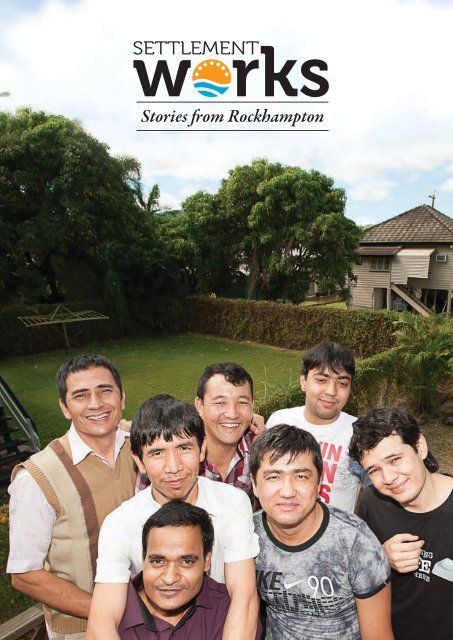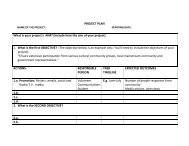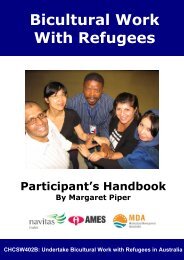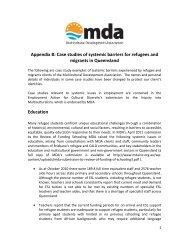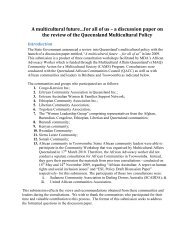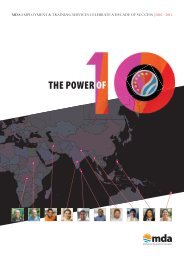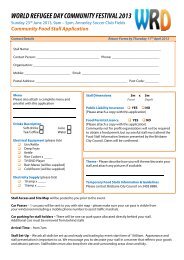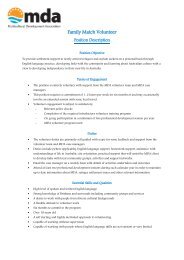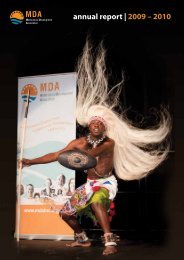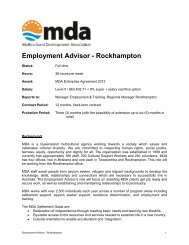Settlement Works - Stories from Rockhampton - Multicultural ...
Settlement Works - Stories from Rockhampton - Multicultural ...
Settlement Works - Stories from Rockhampton - Multicultural ...
Create successful ePaper yourself
Turn your PDF publications into a flip-book with our unique Google optimized e-Paper software.
<strong>Stories</strong> <strong>from</strong> <strong>Rockhampton</strong>
<strong>Stories</strong> <strong>from</strong> <strong>Rockhampton</strong><br />
This report tells the settlement stories<br />
of eight new settlers <strong>from</strong> refugee<br />
backgrounds in <strong>Rockhampton</strong>—their<br />
search for employment and a place<br />
to call home.<br />
<strong>Multicultural</strong> Development Association
Table <strong>Rockhampton</strong> Meatworks number of commencements and resignations<br />
officer, speaks six languages and was<br />
an effective advocate for the men, also<br />
providing orientation support to new<br />
workers.<br />
In February 2012, of the 480 men<br />
employed with Teys 306 (64%) were<br />
actively employed, while 174 (36%) had<br />
moved on and/or resigned.<br />
For the initial nine months, the<br />
workers were employees of AWX<br />
Agribusiness and transferred to Teys’<br />
employ at the end of this time. One<br />
hundred and twenty one (25.2%) of those<br />
employed in the last two years became<br />
ongoing Teys employees.<br />
Of the humanitarian refugees<br />
who resigned or moved on <strong>from</strong> the<br />
meatworks, the main motivation for<br />
leaving was that the work was not as<br />
<strong>Rockhampton</strong> Meatworks — Employment of Humanitarian Refugees<br />
April 2010 to February 2012<br />
Number Proportion Total<br />
Commencements 480 100% 480<br />
Ongoing AWX employees 185 38.54%<br />
Transferred to Teys<br />
employees<br />
121 25.21%<br />
expected, although some who left for this<br />
reason stayed for up to six months. Others<br />
who stayed between three to six months<br />
left to meet up with family overseas and<br />
stayed overseas longer than the company<br />
allowed. This resulted in these men being<br />
designated as resigned or having left their<br />
employment.<br />
From Teys Australia’s perspective,<br />
once refugee workers are trained and you<br />
get to know them, they have a high degree<br />
of loyalty to the plant. Humanitarian<br />
refugees arrive at Teys Australia mostly<br />
as workers unskilled in the meat industry<br />
and Teys Australia develops their skills to<br />
meet the necessary industry requirements.<br />
Some workers then move onto other<br />
industries based on the skills they acquire<br />
working with Teys Australia.<br />
63.75% 306<br />
Resignations 174 36.25% 174<br />
Source: AWX Agribusines, Brisbane, 1 February 2012<br />
According to Teys Australia,<br />
humanitarian refugees working in the<br />
<strong>Rockhampton</strong> meatworks has addressed<br />
a critical shortage of workers and they<br />
have brought significant benefits to the<br />
region. Without humanitarian refugees<br />
and skilled migrants, Teys would find<br />
it very hard to continue production at<br />
sustainable levels at some sites, particularly<br />
in <strong>Rockhampton</strong> and Biloela:<br />
“ If production was reduced or plants<br />
were unable to open locally, then there<br />
would be massive flow on effects in the<br />
region—to farmers, stockyards, stock<br />
agents and other businesses and the<br />
Australia economy. This would run to<br />
millions of dollars.”
CONTENTS<br />
3<br />
5<br />
9 11<br />
CONTENTS<br />
7<br />
13<br />
INTRODUCTION IV<br />
ALI ABBAS REZAI 3<br />
IDRES MOHAMMADI 5<br />
ABBAS ALI REZAI 7<br />
HAIDER ALI AHMADI 9<br />
ABDUL HAMID 11<br />
MOHAMMAD AZAD 13<br />
HOSSEIN DADRAS 14<br />
MOHSEN FADAEE 14<br />
EMPLOYMENT CASE STUDY—ROCKHAMPTON 16
INTRODUCTION<br />
The <strong>Multicultural</strong> Development<br />
Association (MDA) is a major<br />
settlement agency in Queensland<br />
providing settlement support for around<br />
2500 clients each year. MDA assists<br />
refugees to settle across Brisbane, Central<br />
Coast and South West Queensland<br />
including <strong>Rockhampton</strong>.<br />
Our services are delivered through<br />
various strategies including case<br />
management, community engagement<br />
and advocacy. The work of MDA focuses<br />
on building the confidence and capacity<br />
of new arrivals to participate in Australian<br />
society both socially and economically. A<br />
key part of settlement success has been the<br />
creation of new pathways to employment.<br />
Recent years have seen significant<br />
demographic changes in the newly arrived<br />
refugees that MDA assists. Since 2010<br />
there have been increasing numbers of<br />
unaccompanied men between the ages<br />
of 21 and 40 arriving in Australia as<br />
asylum seekers and refugees. This cohort<br />
has a number of strong reasons to find<br />
employment as soon as possible.<br />
Firstly, many have been forced to flee<br />
without any preparation and therefore<br />
have no access to resources and need to<br />
find employment to establish themselves.<br />
Many have left their families behind<br />
and are keen to bring them to safety in<br />
Australia. Added to this desire, there is a<br />
powerful cultural expectation for them to<br />
support immediate and extended family<br />
members who have been left behind.<br />
In addition, many of the newly arrived<br />
refugees have spent some months in<br />
Australian detention centres and are in<br />
search of strategies to fast forward their<br />
connection with the community and to<br />
find ways to overcome the challenges<br />
imposed by detention.<br />
This strong desire for employment<br />
extends to a willingness to re-locate<br />
to regional areas where critical labour<br />
shortages exist. Many of the new arrivals<br />
are highly mobile and willing to work in<br />
jobs that many Australian workers would<br />
reject. A recent MDA survey found that<br />
64% of recently arrived men were willing<br />
to do labouring jobs in Australia regardless<br />
of what their pre-arrival employment<br />
experiences were.<br />
These men are motivated to sustain<br />
their employment which has led to<br />
higher labour retention for employers<br />
and a high level of social participation<br />
in local communities. This has been the<br />
experience in <strong>Rockhampton</strong>, a regional<br />
city of about 116 700 people.<br />
Keys to success in <strong>Rockhampton</strong><br />
Since 2010 many hundreds of refugee<br />
men have travelled to <strong>Rockhampton</strong> to<br />
find work. Two years later, it is a success<br />
story of regional settlement.<br />
In addition to the strong drivers for<br />
work, there are other key ingredients<br />
that have contributed to the successful<br />
settlement outcomes in <strong>Rockhampton</strong>.<br />
History of welcoming new settlers<br />
<strong>Rockhampton</strong> has a long history of<br />
welcoming migrant workers to the<br />
region and this has continued with the<br />
<strong>Rockhampton</strong> community’s welcome to<br />
men <strong>from</strong> the Middle East and South East<br />
Asia. Local services, local communities,<br />
neighbours, businesses and most<br />
individuals have positively embraced this<br />
new group of hopeful settlers.<br />
One new arrival related that: “You know<br />
transport is not that good in <strong>Rockhampton</strong><br />
and I was really struggling to get around after<br />
work. One day my neighbour told me I can use<br />
his car, I almost cried”<br />
Networks of support<br />
There are strong bonds between groups<br />
who have shared similar refugee and<br />
asylum seeking experiences. Information<br />
about work opportunities is readily shared<br />
across national networks of newly arrived<br />
refugees. It was through these networks,<br />
that word spread of the positive work<br />
experiences and the acceptance of the<br />
<strong>Rockhampton</strong> community.<br />
“Word of mouth is everything and as soon as<br />
someone has a good work story to tell, word<br />
gets around” (Mohammad Azad page 13)<br />
Strong local partnerships<br />
The <strong>Rockhampton</strong> Regional Council<br />
through its Access and Equity agenda,<br />
provided a formal welcome to the new<br />
refugees in 2010 that is still remembered<br />
positively. This welcome initiated<br />
the strong collaborative approach to<br />
community building that continues today.<br />
New arrivals have benefited <strong>from</strong><br />
the strong volunteer networks in<br />
the <strong>Rockhampton</strong> area including<br />
organisations such as Sanctuary and<br />
the Central Queensland <strong>Multicultural</strong><br />
Association.<br />
iv SETTLEMENT WORKS | STORIES FROM ROCKHAMPTON<br />
The local AMEP program at TAFE<br />
has partnered with MDA to deliver<br />
English language classes at a time that<br />
suits shift workers.<br />
On 23 June, <strong>Rockhampton</strong> hosted<br />
Walk Together which was part of an<br />
Australia-wide move to welcome<br />
newcomers to Australia. There was<br />
great support <strong>from</strong> the local community<br />
including media. Despite the rain, people<br />
were walking in solidarity with newly<br />
arrived refugees and demonstrating<br />
the strength of the <strong>Rockhampton</strong><br />
community’s support for them.<br />
“These people have come here through a<br />
difficult journey, this is only a few drops of<br />
rain, and I am happy to be able to welcome<br />
people” said one local.<br />
Industry partnerships<br />
A partnership focussed on employment<br />
with AWX, the local Teys Australia<br />
meatworks and MDA has been integral<br />
to the successful settlement of almost<br />
500 newly arrived refugees to the region.<br />
There was a critical shortage of workers<br />
at the meatworks and without these men,<br />
Teys would have found it very hard to<br />
continue production at sustainable levels.<br />
A Teys Australia employer said … “once<br />
refugee workers are trained, and familiar with<br />
Australian work environments and culture,<br />
they have a high degree of loyalty. They now<br />
belong to the local community”.<br />
The partnership approach enabled<br />
AWX to put in place strategies to secure<br />
and retain the workforce needed.<br />
These strategies included:<br />
■■ Employing bicultural workers to<br />
assist with workplace induction and<br />
support<br />
■■ Flexible repayment options for travel<br />
and establishment expenses<br />
■■ Translating materials into community<br />
languages;<br />
■■ Reconfiguring the induction process<br />
to meet the learning needs of men<br />
■■ Ensuring that workers have access to<br />
English classes<br />
Attractive lifestyle and surrounds<br />
From the sub tropical surrounds and<br />
the beach, to the friendly, uncrowded<br />
atmosphere, <strong>Rockhampton</strong> has captured<br />
many of the men’s hearts. In contrast to<br />
their past experiences and their time in<br />
Australian capital cities, <strong>Rockhampton</strong><br />
is a peaceful and desirable place to live.<br />
Local settlement support<br />
MDA’s commitment to regional<br />
settlement in <strong>Rockhampton</strong>, despite<br />
uncertainty about funding viability,<br />
has enabled the provision of settlement<br />
support to newly arrived refugees<br />
and sustainable retention of new<br />
arrivals. When MDA started work in<br />
<strong>Rockhampton</strong> in mid 2011, there was no<br />
certainty about how long people would<br />
work or stay in the town. Creating a<br />
settlement support framework has helped<br />
arrivals to establish themselves in work<br />
and to build a community. Gradually,<br />
things have turned around with less<br />
transience and more people choosing to<br />
remain in <strong>Rockhampton</strong>. Since August<br />
2011, approximately 80% of arrivals are<br />
now staying in <strong>Rockhampton</strong>. They are<br />
working in increasingly diverse local<br />
industries, making friends and establishing<br />
local community connections. In the<br />
last few months, MDA has supported<br />
local Afghan Hazara and Rohingyan<br />
communities with their first steps towards<br />
creating formal community groups.<br />
MDA’s experience in <strong>Rockhampton</strong><br />
demonstrates that a coordinated approach<br />
to settlement involving industry,<br />
community, government and settlement<br />
services works.<br />
SETTLEMENT WORKS | STORIES FROM ROCKHAMPTON v
“<br />
People in Rocky are honest.<br />
I feel like they are friendly and<br />
warm to me; much better than<br />
big cities where people have no<br />
time for you. When my family<br />
comes to Australia, I want them<br />
to settle here in Rocky, my new<br />
”<br />
home.<br />
SETTLEMENT WORKS | STORIES FROM ROCKHAMPTON 1
ALI ABBAS REZAI<br />
I<br />
was born in Logar, Qarbagh, Ghazni,<br />
Afghanistan in a time of war. I was<br />
the middle child between my sister<br />
and brother. During that time, the Soviets<br />
were occupying Afghanistan and my father<br />
had to serve in the army for two years.<br />
When he returned, he owned a shop in<br />
the city. After the Soviets left Afghanistan,<br />
the Taliban took over. They believe that<br />
Hazara people are infidels, and things<br />
became very dangerous for us.<br />
My father was executed by the Taliban<br />
when I was 14. He was killed because he<br />
was Hazara and a shop owner. My mother<br />
went to a friend of my father for help to<br />
flee. At this time, many Hazara people<br />
were leaving Afghanistan for Pakistan<br />
and Iran. We went to Quetta in Pakistan.<br />
There was already an established Hazara<br />
population in Quetta <strong>from</strong> 200 years<br />
before. They had fled there because of<br />
persecution by Amir Abdul Rahman an<br />
Afghani King who committed genocide<br />
against the Hazara people. So you can see<br />
how Hazara people have never known<br />
peace.<br />
For five or six years the situation in<br />
Quetta was good. People were so friendly<br />
and helped us a lot. I worked to take care of<br />
my family selling clothes and then, when<br />
I was 16, loading and unloading trucks.<br />
There was always a threat <strong>from</strong> outside,<br />
and we were only able to mix with our own<br />
people, but at least we were safe. That was<br />
until 2004 when the first bomb blast went<br />
off in Quetta. After the Americans invaded<br />
Afghanistan, many of the Taliban people<br />
came to Pakistan to hide and started to<br />
carry out target attacks in Quetta. Things<br />
began to become bad for us again.<br />
In 2008 I met my wife. After I<br />
finished my work each day I would go to<br />
English classes <strong>from</strong> 6 pm to 7pm. I was<br />
so embarrassed when I was young and too<br />
shy to talk to women. So it was four or five<br />
months before I actually spoke to her. I<br />
had made a plan to get her phone number<br />
and call her on the phone to speak—that<br />
way I would not be too ashamed to talk.<br />
In my culture you do not ask for<br />
approval to be married, so when my<br />
mother approached me and asked me<br />
what my plans for the future were I was<br />
delighted. She met with my future wife<br />
and not long after we got married. We<br />
now have a beautiful son named Farhan<br />
Ali Rezai.<br />
Apart <strong>from</strong> this happiness, life in<br />
Quetta was becoming more and more<br />
dangerous. All over the walls in the street<br />
graffitti was written, saying that Shia<br />
people should be removed—that Hazara<br />
people were not welcome in Pakistan<br />
anymore. So I returned to Afghanistan<br />
to see what the situation was like there. I<br />
thought perhaps my family could return<br />
home. But things were worse there. So I<br />
returned to Quetta and spoke with my<br />
family about what we should do. My wife<br />
did not want me to leave, but my mother<br />
was sure that it was the best option for<br />
us. She said she could not bear to see her<br />
son killed in front of her. There was a big<br />
risk that this may happen as the attacks<br />
targeted men. I needed to stay alive to<br />
take care of my family, so I took the long<br />
journey to seek asylum.<br />
In Quetta I played football with a<br />
guy called Lucky. Lucky and I kept in<br />
touch through Facebook while I was in<br />
detention. He told me that he had found<br />
good work for refugees in a town called<br />
<strong>Rockhampton</strong>. When I was granted my<br />
permanent visa I moved to <strong>Rockhampton</strong><br />
as quickly as I could and have been here<br />
ever since. I love living here, because<br />
whenever I get sad or miss my family<br />
I have my friends here to cheer me up.<br />
They understand what I am feeling and<br />
help me. On Saturdays we go to the beach<br />
together, to Yeppoon or Emu Park and<br />
have a BBQ. When I was in Brisbane<br />
I heard people talking about the Gold<br />
Coast. I have never been there, but I think<br />
that Yeppoon would be a much better<br />
place. On Sundays we all go shopping to<br />
get our food for the week, but then try to<br />
rest as much as we can because we know<br />
we have work on Monday.<br />
“<br />
The Burmese guys who live<br />
with us are so friendly. They are<br />
refugees too and they understand<br />
what our lives have been like, so it<br />
is easy for us to get along. We sit<br />
together and eat and drink tea<br />
together. They are really funny<br />
”<br />
guys.<br />
SETTLEMENT WORKS | STORIES FROM ROCKHAMPTON 3
IDRES MOHAMMADI<br />
I<br />
was lucky. I was sponsored by my<br />
brother in law who came to Australia<br />
in 2000. So I didn’t have to spend time<br />
in detention. For that I am thankful. I<br />
received sponsorship in August 2011. At<br />
the time I was living in Quetta. I had left<br />
Afghanistan when I was very small.<br />
At first I went to Mildura to join my<br />
brother in law and sister. I worked for 3<br />
months on a small farm, but this was only<br />
casual, seasonal work. So when a friend<br />
told me that I could get good, regular work<br />
in <strong>Rockhampton</strong> I left Mildura right away.<br />
I like living in this house because they<br />
are my fellows.<br />
I enjoy talking with my friends and<br />
going together to BBQs and having<br />
fun. I don’t like alcohol, and we don’t<br />
really drink but we can still have fun.<br />
The Burmese guys who live here and the<br />
Korean guys who work with me, we are<br />
all great friends. Even though I had never<br />
met anyone <strong>from</strong> Korea before I came to<br />
<strong>Rockhampton</strong>, now we are joking and<br />
laughing all day at work.<br />
My favourite place to go is Yeppoon,<br />
but I am not a good swimmer so I just<br />
make sure I stay between the flags where<br />
it is safe to swim. The lifeguards there are<br />
really nice guys too.<br />
“<br />
I love living with these guys<br />
so much. If they move house, I will<br />
move with them. Now all I need<br />
”<br />
is an Australian girlfriend.<br />
SETTLEMENT WORKS | STORIES FROM ROCKHAMPTON 5
ABBAS ALI REZAI<br />
I<br />
was born in Dasht, Nili, Daikundi,<br />
Afghanistan. I come <strong>from</strong> a small<br />
family, and have only one brother<br />
and one sister. I left Afghanistan when I<br />
was 15 years old, as a refugee. Like most<br />
Afghanis you will meet in <strong>Rockhampton</strong>,<br />
we all left during that time because it was<br />
too dangerous for us to stay. Hazara people<br />
were being targeted every day.<br />
We went to Quetta, where it was safe<br />
and happy for a while. But after 2003<br />
things began to worsen. Day after day<br />
more attacks happened. We were very<br />
anxious and all we could talk about was:<br />
“should we stay or should we go?” One<br />
good thing though that happened during<br />
that time was I met and married my wife,<br />
Masooma. We now have two beautiful<br />
children.<br />
My family decided I had to leave<br />
Pakistan. I had to stay alive for my family,<br />
and with more and more attacks it was too<br />
dangerous to stay in Quetta.<br />
I hadn’t had my visa very long when<br />
an old friend, Mohammad Azad , called<br />
me to tell me that the meat works he was<br />
working at was looking for more workers.<br />
I quickly joined him in <strong>Rockhampton</strong>.<br />
<strong>Rockhampton</strong> is a beautiful small<br />
town; easy to get around, safe and not<br />
too crowded. It is very multicultural and<br />
I enjoy mixing with people <strong>from</strong> all over<br />
the world. In Quetta, all Hazara people<br />
had to keep to themselves as it was too<br />
dangerous to talk with strangers, but<br />
in <strong>Rockhampton</strong>, people are always so<br />
friendly and talk to me, asking where I<br />
am <strong>from</strong> and what my life has been like.<br />
We are actually a peaceful culture, and<br />
wish to live with other people without<br />
fighting, without tension and without<br />
conflict. I think finally we have found<br />
that place in <strong>Rockhampton</strong>.<br />
This week I do the cleaning and Ali<br />
does the cooking. We share to make it<br />
easier for us. We all miss our wives I think.<br />
What I have found in <strong>Rockhampton</strong><br />
is freedom. I can be myself, talk to who<br />
I want to, and go where I want. There<br />
is a feeling I have here like anything is<br />
possible.<br />
Although I am so happy here, I still do<br />
worry about my family at home. I lodged<br />
my humanitarian sponsorship application<br />
for my family 2 years ago, but nothing has<br />
happened. Recently I lodged a spouse visa<br />
also, so I hope that is approved soon. I<br />
miss them so much.<br />
“<br />
Today is my day to clean the<br />
house. We all take turns doing the<br />
”<br />
different jobs to help out.<br />
SETTLEMENT WORKS | STORIES FROM ROCKHAMPTON 7
HAIDER ALI AHMADI<br />
My name is Haider Ali Ahmadi<br />
and I was born in Kisaw,<br />
Afghanistan. I am Hazara<br />
and I am proud to call myself Hazara. In<br />
the year 2000 my father was killed by the<br />
Taliban, so <strong>from</strong> the age of 12 I had to<br />
work to support my family.<br />
I worked selling rice and vegetables<br />
in Pakistan. I would buy them <strong>from</strong> the<br />
Pashtoon areas and take them and sell<br />
them in the Hazara areas. This was very<br />
dangerous, but I was small and young and<br />
fast and no one could catch me….until one<br />
day when some members of the Taliban<br />
caught me. That is why I am missing a<br />
front tooth and have a scar on my arm.<br />
They cut me with a knife there; that was<br />
my warning. They told me because I was<br />
just a boy they would not kill me, but if<br />
they saw me there again they would hurt<br />
me worse. So I never went back.<br />
I worked in many jobs after that,<br />
but it was becoming harder and harder<br />
to earn enough money for my family and<br />
stay safe. So at the age of 18 I made the<br />
long journey to Australia.<br />
I spent 2 years in detention, more time<br />
than any of my friends.<br />
Then I went to Sydney for 2 months,<br />
but it was too big and I didn’t feel like<br />
it had a soul. So when I heard about<br />
Mohammad Azad in <strong>Rockhampton</strong>,<br />
I rang him to ask about it. It sounded<br />
like a good place to live. It is such a nice<br />
place with such nice people. We are never<br />
harassed or bothered here. We can live in<br />
peace.<br />
The situation in Quetta is so bad, that<br />
people are too scared to leave their houses.<br />
Sometimes I cannot believe the freedom I<br />
get to enjoy here in <strong>Rockhampton</strong>.<br />
“<br />
The houses are big and so<br />
different <strong>from</strong> the Afghani houses.<br />
The back yards are green and full<br />
”<br />
of plants and trees.<br />
SETTLEMENT WORKS | STORIES FROM ROCKHAMPTON 9
ABDUL HAMID<br />
I<br />
am a Rohingyan man <strong>from</strong> Burma.<br />
I have five brothers. I only studied<br />
for five years in school. I had to leave<br />
early to work as a fisherman to support<br />
my family. When I was fifteen I opened a<br />
shop selling clothes. This was better money<br />
than working as a fisherman, but was much<br />
harder as men <strong>from</strong> the government would<br />
come in and take clothes <strong>from</strong> my shop<br />
and not pay for them. Soon they sent<br />
me bankrupt. So I started working in my<br />
brother’s shop helping him. But he was<br />
having the same problems as I was with<br />
government people stealing.<br />
One day my Aunty came to me to<br />
tell me about problems she was having<br />
with some government officials who were<br />
forcing her to sign documents that would<br />
mean she would not own her home any<br />
longer. She refused and they beat her.<br />
I went with her to her house to help<br />
her and they beat me also. I was beaten<br />
unconscious. When I woke up I didn’t<br />
know what had happened. My Aunty had<br />
disappeared and I didn’t know where she<br />
had gone. No one knew. When I went<br />
home my family asked me what had<br />
happened to me, but I didn’t want to tell<br />
them and scare them more.<br />
I spent a long time searching for my<br />
Aunty, but I could not find her anywhere.<br />
I went to the immigration office to ask<br />
them, but they said they knew nothing<br />
about it. Later I was told she had fled the<br />
country because she was scared for her life.<br />
Not long after I also left Burma, to seek<br />
asylum. I stayed in Malaysia for 3 years<br />
and worked in construction. I wanted to<br />
come to Australia so I could live freely and<br />
independently. In Australia, Rohingyan<br />
people are not persecuted and we are able<br />
to have human rights. That is something I<br />
have never experienced before.<br />
<strong>Rockhampton</strong> is a beautiful town; it is<br />
easy to go everywhere. I am very thankful<br />
to the people of <strong>Rockhampton</strong>.<br />
Living with the Hazara people is<br />
good. They are so friendly.<br />
“<br />
We don’t look at each<br />
other as being <strong>from</strong> different<br />
cultures; we look at each other<br />
”<br />
as friends.<br />
SETTLEMENT WORKS | STORIES FROM ROCKHAMPTON 11
MOHAMMAD AZAD<br />
I<br />
fled Afghanistan after several narrow<br />
escapes and attempts on my life by the<br />
Taliban. I was working in Afghanistan<br />
for the Canadian and French armies as well<br />
as the American special forces. I can speak<br />
6 languages including 3 local Afghani<br />
languages. There was no choice but to flee<br />
Afghanistan during the conflict and I took<br />
my family to Pakistan where they remain<br />
today. I am always thinking of them and<br />
hoping they are safe. In 2009 I decided to<br />
leave Pakistan when it became unsafe and<br />
sought refugee status in Australia. After I<br />
arrived I spent four and a half months time<br />
in detention on Christmas Island. These<br />
were difficult times but now that I’m in<br />
<strong>Rockhampton</strong> with many, many men who<br />
have shared similar experiences we are able<br />
to support one another. I think this helps<br />
many new people to <strong>Rockhampton</strong>. They<br />
get some comfort <strong>from</strong> what they have<br />
experienced while they are separated <strong>from</strong><br />
their families.<br />
I arrived in <strong>Rockhampton</strong> with a<br />
couple of friends and for the first two<br />
days we walked each and every street of<br />
this new city. This is when I fell in love<br />
with <strong>Rockhampton</strong>. But the first few<br />
months were hard. We lived at the local<br />
backpackers and I remember feeling very<br />
nervous. I had only been out of detention<br />
for a few months and was unsure about<br />
how anything worked in Australia or who<br />
to contact for anything.<br />
We had no rental history so getting a<br />
house was a real struggle. I had heard <strong>from</strong><br />
others that living in a new place is very<br />
difficult. They had told me that sometimes<br />
the local people aren’t welcoming or act<br />
aggressively or even violently towards us<br />
because we’re different. This isn’t what<br />
is happening in <strong>Rockhampton</strong>. I know<br />
that <strong>Rockhampton</strong> has a long history of<br />
welcoming refugees and other migrants<br />
<strong>from</strong> Vietnam, Brazil and the Philippines.<br />
The locals of <strong>Rockhampton</strong> have always<br />
welcomed us into their community and<br />
it’s because they have done so for a long<br />
time and know about migrants.<br />
My job with AWX at the meatworks<br />
was to support many new refugees—<br />
Afghans, Kurds, Tamils and men <strong>from</strong><br />
Burma into the local community. Almost<br />
100 men moved to <strong>Rockhampton</strong> within<br />
the first few weeks of my arrival and<br />
each week tens more men arrived, one<br />
group after another. Word of mouth is<br />
everything and as soon as someone has a<br />
good work story to tell, word gets around.<br />
Many men find it difficult to get work<br />
because they don’t speak English fluently<br />
and their skills are not recognised. Also,<br />
many men don’t understand about how<br />
you get a job. In Australia it’s a competitive<br />
process and you need a resume and have<br />
an interview. In Afghanistan it depends<br />
much more on who you know.<br />
Now everyone wants to come to<br />
<strong>Rockhampton</strong>. I have helped more than<br />
700 people settle in <strong>Rockhampton</strong>.<br />
Some have not stayed, but we now have<br />
a community group of more than 500<br />
refugees who plan to make <strong>Rockhampton</strong><br />
home.<br />
In 2010 the local city council held a<br />
welcome ceremony that was great because<br />
it really brought everyone together.<br />
Since that time other local community<br />
groups including the Philippino and<br />
Indian communities have invited us<br />
to their events. Local Aboriginal and<br />
Muslim communities have also offered us<br />
practical assistance and invited us to their<br />
celebrations. This has not been possible<br />
for many other Hazaras living in Brisbane<br />
and Logan.<br />
Since MDA set up its office here it<br />
has made such a difference to people<br />
staying and settling. Recently I secured<br />
a job at MDA which I love because I<br />
can help more people to settle well in<br />
<strong>Rockhampton</strong>. I really like working with<br />
my colleagues.<br />
“<br />
I hope to buy a house here<br />
for my family and I have visited the<br />
school where I want my children<br />
to learn. I can see my wife and<br />
children having a wonderful life<br />
”<br />
here in <strong>Rockhampton</strong>.<br />
SETTLEMENT WORKS | STORIES FROM ROCKHAMPTON 13
HOSSEIN DADRAS<br />
I<br />
arrived in <strong>Rockhampton</strong> in October<br />
2011. Like everyone, I came to work<br />
in the meat factory. But I didn’t stay<br />
very long, only around a month, because<br />
I hated seeing all the blood. After I quit,<br />
I moved to Sydney, but I found it hard to<br />
settle because it is so big and noisy. I missed<br />
<strong>Rockhampton</strong>. So after two months, I<br />
returned to <strong>Rockhampton</strong> and began<br />
searching for a job.<br />
I was staying with a friend initially<br />
and his girlfriend introduced me to<br />
Lynda, who has a real estate and cleaning<br />
business. I volunteered with Lynda to gain<br />
some experience and build my resume.<br />
After doing this for a little time, Lynda<br />
MOHSEN FADAEE<br />
I<br />
came to <strong>Rockhampton</strong> one week after<br />
Hossein. After some time in the meat<br />
works, I moved to Melbourne to find<br />
some different work. I started working as<br />
a painter for a company in Melbourne, but<br />
they were offering to pay me cash-in-hand<br />
illegally and I felt uncomfortable breaking<br />
the law like that.<br />
So when Hossein called me and<br />
told me that Mazda were looking to<br />
hire new people, I quickly returned to<br />
<strong>Rockhampton</strong>. I now work with Hossein<br />
and I love it. We are meeting new people<br />
and working with some great guys. We<br />
laugh a lot at work.<br />
suggested I apply for a job at the Mazda<br />
car dealer in town. Ever since I was a child<br />
I have loved working with cars and being<br />
around cars, so when my application<br />
was accepted I was overwhelmed<br />
with happiness. My job is to apply the<br />
accessories that the customer orders to<br />
the vehicles. I get to work with my hands<br />
and tools, and I love it. My boss tells me<br />
I do good work and he is very happy with<br />
me. His praise means a lot.<br />
My case manager at MDA has helped<br />
me to get a lease agreement and I am now<br />
living in a house that I love. My favourite<br />
thing about <strong>Rockhampton</strong> is the quiet.<br />
Oh, and I love a beer.<br />
I am very happy I came back to<br />
<strong>Rockhampton</strong>. To meet true Aussie<br />
people, you need to move to the small<br />
cities like <strong>Rockhampton</strong>. To learn<br />
about the true soul of Australia, to learn<br />
the Australian accent and way of life,<br />
<strong>Rockhampton</strong> is the place to be. It is<br />
beautiful and small and the people are<br />
really good.<br />
From the beginning MDA took my<br />
hand and showed me the way. Without<br />
them I would have been lost. They gave<br />
me a lot of knowledge and strength<br />
to begin my new life, and I am forever<br />
thankful to them for that.<br />
“<br />
After a hard day’s work, I<br />
kick off my boots, sit out on the<br />
veranda and enjoy a cold beer.<br />
There is no better feeling in the<br />
”<br />
world.<br />
“<br />
For me, <strong>Rockhampton</strong> is<br />
”<br />
definitely the place to be.<br />
14 SETTLEMENT WORKS | STORIES FROM ROCKHAMPTON<br />
SETTLEMENT WORKS | STORIES FROM ROCKHAMPTON 15
EMPLOYMENT CASE STUDY—ROCKHAMPTON<br />
16 SETTLEMENT WORKS | STORIES FROM ROCKHAMPTON<br />
In less than two years, 480<br />
unaccompanied male humanitarian<br />
refugees were employed to work<br />
at the Teys Australia meatworks in<br />
<strong>Rockhampton</strong>. Some of these men were<br />
surveyed as part of MDA’s ‘Snapshot—<br />
employment in early settlement 2012’.<br />
The Teys Australia <strong>Rockhampton</strong><br />
plant has a slaughtering capacity of<br />
1,731 head per day and is Australia’s<br />
largest single shift slaughterer. It is<br />
<strong>Rockhampton</strong>’s largest single employer.<br />
It is a company: “…committed to valuing<br />
differences, respecting all individuals and<br />
maintaining an environment in which<br />
everyone is treated with dignity. Leveraging<br />
diversity enables innovation and creativity<br />
which enhances sustainable business<br />
opportunities. This commitment is supported<br />
by our long-standing policy of providing equal<br />
opportunity in employment to all qualified<br />
applicants.”<br />
Teys needed workers as it was unable<br />
to fill vacancies. The company had<br />
positive experiences with humanitarian<br />
refugee and migrant families in its Biloela<br />
plant and was therefore interested in a<br />
partnership for <strong>Rockhampton</strong>.<br />
Teys acknowledges there can be<br />
challenges in employing people with<br />
minimal English and has taken a number<br />
of steps to support the transition into the<br />
workplace including:<br />
■■ Translating materials into community<br />
languages;<br />
■■ Reconfiguring the induction process<br />
to meet the learning needs of the<br />
men; and<br />
■■ Ensuring that workers have access to<br />
English classes.<br />
The partnership between Teys<br />
Australia, AWX and MDA developed<br />
<strong>from</strong> a recognition by these companies<br />
that people who have come to Australia<br />
as refugees have a strength and<br />
determination to succeed that translates<br />
into reliability, loyalty and commitment<br />
in the workplace. Following the successful<br />
employment of a small number of men<br />
<strong>from</strong> Sri Lanka by AWX through MDA’s<br />
settlement program, the program grew<br />
and a number of initiatives were put in<br />
place to ensure appropriate job matching<br />
and supports were in place.<br />
Many of the early applicants had<br />
experience working for themselves, as<br />
shepherds, selling fruit or trinkets, or<br />
on building sites as tilers, concreters,<br />
plumbers or electricians. None had formal<br />
qualifications for their trades. AWX<br />
worked to secure these men specific jobs<br />
at the meatworks. This strategy required<br />
a focus on a thorough pre-induction<br />
covering safety, personal hygiene, product<br />
hygiene, food safety, good manufacturing<br />
practice and workplace readiness.<br />
AWX also provided essential practical<br />
support on the ground to facilitate access<br />
to these jobs. Many of these workers<br />
received support to locate temporary<br />
accommodation, transport <strong>from</strong> the<br />
workplace; and connection to community<br />
services and events. The company met the<br />
upfront costs of travel, medical expenses<br />
and accommodation.<br />
AWX and MDA attribute the<br />
engagement of staff <strong>from</strong> similar ethnic<br />
backgrounds as a success factor for the<br />
ongoing employment of humanitarian<br />
refugees at the Teys meatworks in<br />
<strong>Rockhampton</strong>. One of the people<br />
formerly employed as a recruitment<br />
SETTLEMENT WORKS | STORIES FROM ROCKHAMPTON 17
Table <strong>Rockhampton</strong> Meatworks number of commencements and resignations<br />
officer, speaks six languages and was<br />
an effective advocate for the men, also<br />
providing orientation support to new<br />
workers.<br />
In February 2012, of the 480 men<br />
employed with Teys 306 (64%) were<br />
actively employed, while 174 (36%) had<br />
moved on and/or resigned.<br />
For the initial nine months, the<br />
workers were employees of AWX<br />
Agribusiness and transferred to Teys’<br />
employ at the end of this time. One<br />
hundred and twenty one (25.2%) of those<br />
employed in the last two years became<br />
ongoing Teys employees.<br />
Of the humanitarian refugees<br />
who resigned or moved on <strong>from</strong> the<br />
meatworks, the main motivation for<br />
leaving was that the work was not as<br />
<strong>Rockhampton</strong> Meatworks — Employment of Humanitarian Refugees<br />
April 2010 to February 2012<br />
Number Proportion Total<br />
Commencements 480 100% 480<br />
Ongoing AWX employees 185 38.54%<br />
Transferred to Teys<br />
employees<br />
121 25.21%<br />
expected, although some who left for this<br />
reason stayed for up to six months. Others<br />
who stayed between three to six months<br />
left to meet up with family overseas and<br />
stayed overseas longer than the company<br />
allowed. This resulted in these men being<br />
designated as resigned or having left their<br />
employment.<br />
From Teys Australia’s perspective,<br />
once refugee workers are trained and you<br />
get to know them, they have a high degree<br />
of loyalty to the plant. Humanitarian<br />
refugees arrive at Teys Australia mostly<br />
as workers unskilled in the meat industry<br />
and Teys Australia develops their skills to<br />
meet the necessary industry requirements.<br />
Some workers then move onto other<br />
industries based on the skills they acquire<br />
working with Teys Australia.<br />
63.75% 306<br />
Resignations 174 36.25% 174<br />
Source: AWX Agribusines, Brisbane, 1 February 2012<br />
According to Teys Australia,<br />
humanitarian refugees working in the<br />
<strong>Rockhampton</strong> meatworks has addressed<br />
a critical shortage of workers and they<br />
have brought significant benefits to the<br />
region. Without humanitarian refugees<br />
and skilled migrants, Teys would find<br />
it very hard to continue production at<br />
sustainable levels at some sites, particularly<br />
in <strong>Rockhampton</strong> and Biloela:<br />
“ If production was reduced or plants<br />
were unable to open locally, then there<br />
would be massive flow on effects in the<br />
region—to farmers, stockyards, stock<br />
agents and other businesses and the<br />
Australia economy. This would run to<br />
millions of dollars.”
<strong>Multicultural</strong> Development Association<br />
Head Office<br />
Brisbane <strong>Multicultural</strong> Centre<br />
28 Dibley St, Woolloongabba Q 4102<br />
phone 07 3337 5400<br />
Northside Office<br />
217A Lutwyche Road, Windsor Q 4030<br />
phone 07 3357 5786<br />
Toowoomba Office<br />
166A Hume St, Toowoomba Q 4350<br />
phone 07 4632 1466<br />
<strong>Rockhampton</strong> Office<br />
46 Denham Street<br />
<strong>Rockhampton</strong> Q 4700<br />
For all offices<br />
fax 07 3337 5444<br />
email mailbox@mdabne.org.au<br />
www.mdainc.org.au


